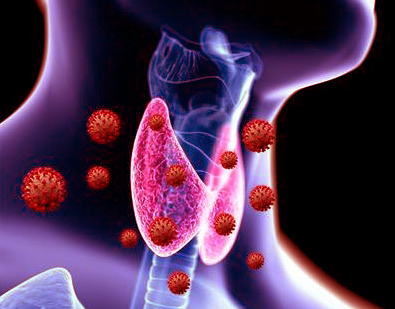Nikhil Prasad Fact checked by:Thailand Medical News Team Sep 27, 2024 1 year, 4 months, 3 days, 47 minutes ago
Medical News: A new study conducted by researchers from Shanghai Public Health Clinical Center and Shanghai Qingpu District Zhujiajiao People’s Hospital has uncovered an important relationship between thyroid function and the severity of COVID-19 in patients infected with SARS-CoV-2. This
Medical News report explores their findings, shedding light on how thyroid disorders may impact the prognosis of severe COVID-19. The study provides valuable insights that can help both medical professionals and the general public better understand the role of the thyroid in this widespread illness.
 Thyroid function linked to severe COVID-19 outcomes
Study Overview
Thyroid function linked to severe COVID-19 outcomes
Study Overview
The study was designed as a retrospective cohort analysis, focusing on patients admitted to a Shanghai hospital between February and May 2022 during a peak of COVID-19 cases. A total of 3,161 individuals were included, with thyroid function tests performed within 24 hours of hospital admission. Based on their thyroid hormone levels, the patients were categorized into five groups: normal thyroid function, non-thyroidal illness syndrome (NTIS), hypothyroidism, thyrotoxicosis, and unclassified.
Researchers aimed to examine how thyroid dysfunction, particularly NTIS and hypothyroidism, related to severe COVID-19 outcomes.
Key Findings
Thyroid Function and COVID-19 Severity
Among the 3,161 patients studied, 7.7% developed severe COVID-19, defined by criteria such as a high respiratory rate, low blood oxygen levels, and the need for intensive care or mechanical ventilation. The most common thyroid condition found in these patients was NTIS, affecting 36.5% of the study population, followed by hypothyroidism in 6.7% of cases.
One key discovery was that patients with NTIS or hypothyroidism were at a significantly higher risk of developing severe COVID-19 compared to those with normal thyroid function. This elevated risk persisted even after adjusting for other variables like age, sex, and preexisting conditions such as diabetes. NTIS patients were found to have 2.4 times the odds of developing severe COVID-19, while hypothyroid patients were 2.3 times more likely to experience severe outcomes.
The Role of TT3 Levels
An essential aspect of this research involved the total triiodothyronine (TT3) hormone. Researchers found that lower TT3 levels were closely associated with severe COVID-19 in both NTIS and hypothyroid patients. For every small increase in TT3 levels, the risk of severe COVID-19 decreased. This means that patients with higher TT3 levels, even among those with thyroid dysfunction, had a better prognosis. This finding is crucial for understanding how the body’s response to the virus can be influenced by thyroid hormones.
Inflammation and Immune Response
The study also highlighted the role of inflammation and immune system function in patients with thyroid disorders. Lower TT3 levels were correlated with higher levels of inflammatory markers such
as C-reactive protein (CRP) and interleukin-6 (IL-6). These markers are commonly elevated in severe COVID-19 cases, indicating that thyroid dysfunction could contribute to the body’s inflammatory response during infection.
Thyroid Function and Hospitalization
Beyond the increased risk of severe outcomes, thyroid dysfunction also influenced the length of hospital stays and the need for oxygen therapy. Patients with NTIS had longer hospitalizations and were more likely to require oxygen support compared to those with normal thyroid function. These findings suggest that thyroid health may play a significant role in the recovery process for COVID-19 patients.
What Is NTIS and Why Does It Matter?
Non-thyroidal illness syndrome (NTIS), also known as euthyroid sick syndrome, occurs when thyroid hormone levels are abnormal, but the thyroid gland itself is not diseased. It’s often seen in patients suffering from severe illnesses like infections, heart failure, or pneumonia. NTIS is characterized by low levels of TT3, while thyroid-stimulating hormone (TSH) may remain normal or slightly elevated.
The study’s findings suggest that NTIS may serve as an early warning sign of deteriorating health in COVID-19 patients. The strong association between NTIS and severe outcomes emphasizes the importance of monitoring thyroid hormone levels in people hospitalized with COVID-19.
How Hypothyroidism Affects COVID-19 Outcomes
Hypothyroidism, a condition where the thyroid gland does not produce enough hormones, was another significant factor in the study. Although hypothyroidism only accounted for 6.7% of the patients, the risk of severe COVID-19 was notably higher in this group. Patients with hypothyroidism were more likely to develop complications like respiratory failure, requiring mechanical ventilation.
This finding underscores the need for healthcare providers to be vigilant when treating COVID-19 patients with known thyroid disorders, as they may be at a greater risk for severe illness.
Conclusion
The relationship between thyroid function and COVID-19 severity is becoming increasingly clear, thanks to research like this. The study concludes that patients with NTIS or hypothyroidism are at a significantly higher risk of developing severe COVID-19. Additionally, lower TT3 levels are strongly associated with worse outcomes, making thyroid hormone levels a potential indicator of disease severity.
As the world continues to grapple with COVID-19, these findings highlight the importance of considering thyroid health in managing the disease. For individuals with thyroid dysfunction, especially those with low TT3 levels, early intervention and close monitoring may be key to improving outcomes.
The study findings were published in the peer-reviewed journal: Frontiers in Endocrinology.
https://www.frontiersin.org/journals/endocrinology/articles/10.3389/fendo.2024.1361479/full
For the latest COVID-19 News, keep on logging to Thailand
Medical News.
Read Also:
https://www.thailandmedical.news/news/how-omicron-and-thyroid-dysfunction-impact-covid-19-severity-and-mortality
https://www.thailandmedical.news/news/viral-infections-including-covid-19-and-thyroid-cancer-a-new-threat-emerges
